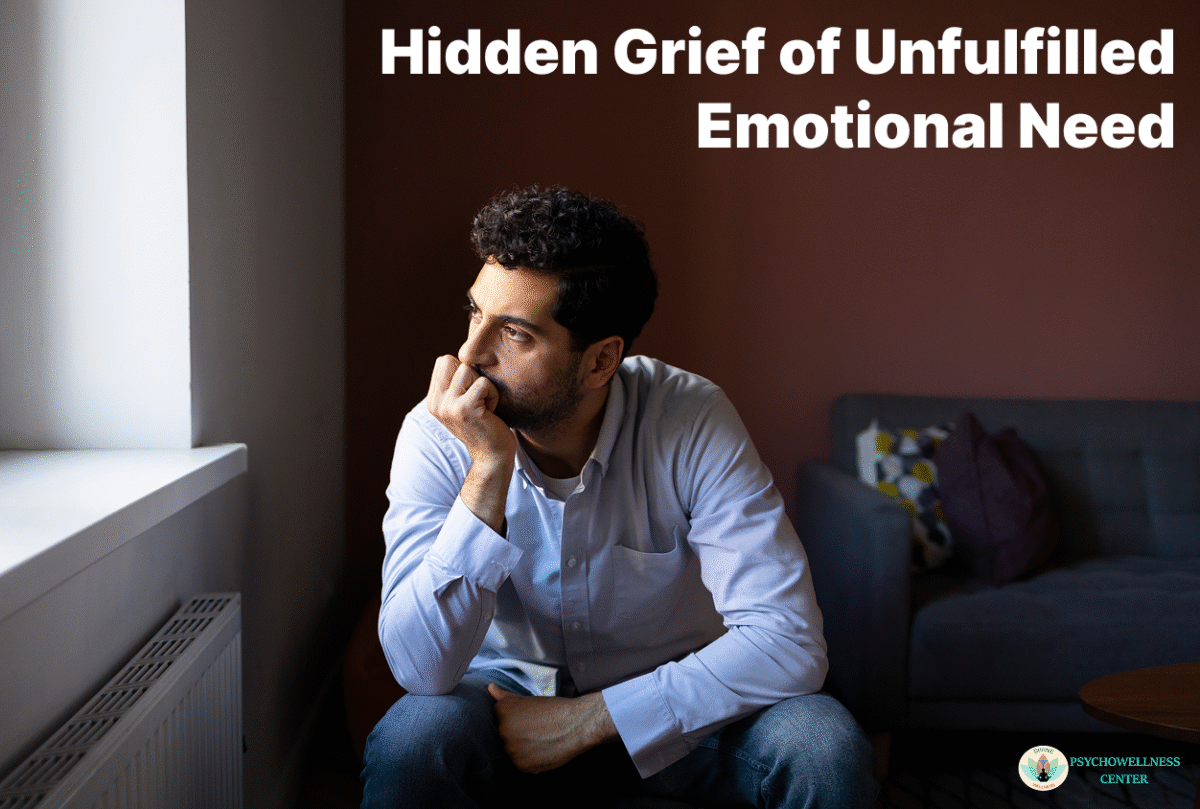Grief is often associated with the loss of a loved one, but not all grief is visible. Many individuals experience a quieter, less acknowledged form of sorrow stemming from unfulfilled emotional needs. These unmet needs can lead to a profound sense of loss that, while not immediately apparent, significantly impacts one’s emotional well-being. Understanding and addressing this hidden grief is crucial for healing and personal growth.
Understanding Hidden Grief
Hidden grief arises when essential emotional needs are not met, leading to feelings of emptiness, longing, and sadness. These needs include:
- Love and affection: The need for emotional warmth and connection.
- Validation and acceptance: The desire to be seen, heard, and understood.
- Security and safety: The need for a stable and supportive environment.
- Autonomy and respect: The desire for independence and acknowledgement of personal boundaries.
When these needs are consistently unmet, individuals may experience a form of grief that is not easily recognized or acknowledged by themselves or others. This type of grief is often internalized and can manifest in various ways, including emotional numbness, chronic sadness, or difficulty forming close relationships.
Signs and Symptoms
Unlike traditional grief, which often involves outward expressions of sorrow, hidden grief may present through subtle signs such as:
- Persistent feelings of emptiness or loneliness: A constant sense of something missing, even when surrounded by others.
- Difficulty trusting others: Hesitancy in forming close relationships due to past emotional neglect.
- Low self-esteem or self-worth: A diminished sense of value stemming from unmet emotional needs.
- Emotional numbness or detachment: A coping mechanism to avoid the pain of unaddressed grief.
- Chronic sadness or depression: Ongoing feelings of sadness without a clear cause.
Recognizing these signs is the first step toward healing hidden grief. Acknowledging the existence of unfulfilled emotional needs allows individuals to begin addressing and processing their feelings.
The Impact of Unfulfilled Emotional Needs
Unmet emotional needs can have profound effects on an individual’s mental and physical health. Research indicates that childhood emotional neglect, characterized by a lack of emotional attunement and validation from caregivers, can lead to long-term psychological issues such as depression, anxiety, and difficulties in forming healthy relationships. This form of neglect is often overlooked because the absence of emotional support is not as immediately apparent as physical neglect or abuse.
Furthermore, the societal tendency to overlook or dismiss certain forms of grief, known as disenfranchised grief, can exacerbate feelings of isolation and invalidation. Individuals grieving unfulfilled emotional needs may feel that their pain is not recognized or understood by others, leading to further emotional distress.
Healing Hidden Grief
Healing from hidden grief involves acknowledging the unmet emotional needs and taking steps to address them. Effective strategies include:
- Therapy and Professional Support: Engaging with mental health professionals can provide a safe space to explore and process hidden grief. Therapy modalities such as cognitive-behavioural therapy (CBT) and trauma-informed approaches can be particularly beneficial.
- Mindfulness and Self-Compassion: Practices like mindfulness meditation and self-compassion exercises help individuals reconnect with their emotions and develop a kinder, more understanding relationship with themselves.
- Building Supportive Relationships: Cultivating relationships with empathetic and understanding individuals can help fulfill emotional needs and provide a sense of belonging and connection.
- Inner Child Work: Addressing unresolved childhood emotional wounds through inner child work can facilitate healing by reconnecting with the parts of oneself that experienced neglect or emotional pain.
- Resilience Building: Developing resilience through coping strategies, stress management techniques, and fostering a positive outlook can aid in navigating the challenges associated with hidden grief.
The Role of Counselling
In today’s world, counselling platforms like Psychowellness Center offer accessible support for individuals dealing with hidden grief. These platforms connect individuals with top therapists who can provide guidance and support tailored to their unique experiences. Counselling can be particularly beneficial for those who may face barriers to in-person therapy, such as geographical location, time constraints, or social stigma.
Conclusion
Hidden grief stemming from unfulfilled emotional needs is a profound and often overlooked aspect of human experience. Recognizing and addressing this type of grief is essential for emotional healing and personal growth. Through therapy, self-compassion, supportive relationships, and resilience-building practices, individuals can begin to heal from the invisible wounds of unmet emotional needs.
Healing from hidden grief often requires compassionate guidance and therapeutic support. The Psychowellness Center, located in Dwarka Sector-17 and Janakpuri, New Delhi (011-47039812 / 7827208707), offers specialized counseling and psychotherapy for individuals struggling with unfulfilled emotional needs, childhood neglect, and unresolved grief. Their team of experienced clinical psychologists and therapists uses evidence-based approaches such as Cognitive Behavioral Therapy (CBT), Emotion-Focused Therapy (EFT), and Inner Child Healing to help clients process emotional pain, rebuild self-worth, and foster emotional control. For those seeking flexible and confidential online therapy, TalktoAngel, a trusted mental health platform, connects individuals with expert grief counselors and trauma-informed psychologists who provide empathetic, personalized care. Together, these platforms create safe, supportive spaces where individuals can understand their hidden grief, nurture self-compassion, and begin a meaningful journey toward emotional healing and inner peace.
Contribution: Dr. R.K. Suri, Clinical Psychologist, and Ms. Sangeeta Pal, Counselling Psychologist
References
- Doka, K. J. (1989). Disenfranchised grief: Recognizing hidden sorrow. Lexington Books.
- Gerhardt, S. (2015). Why love matters: How affection shapes a baby’s brain. Routledge.
- Neff, K. D. (2011). Self-compassion: The proven power of being kind to yourself. William Morrow.
- Shneidman, E. S. (1998). The psychological pain of grief. In The psychology of grieving (pp. 25-40). Oxford University Press.
- https://www.psychowellnesscenter.com/Blog/understanding-the-emotional-impact-of-grief-on-mental-health/
- https://www.psychowellnesscenter.com/Blog/best-psychologist-in-janakpuri-for-grief-and-loss/
- https://www.psychowellnesscenter.com/Blog/how-does-grief-affect-children/
- https://www.psychowellnesscenter.com/Blog/breaking-the-stigma-changing-perceptions-about-special-education/
- https://www.talktoangel.com/blog/learning-from-regrets-and-living-in-the-present
- https://www.psychowellnesscenter.com/Blog/the-impact-of-prolonged-grief-disorder-on-mental-health/
- https://www.psychowellnesscenter.com/service-trauma-counselling-delhi/

